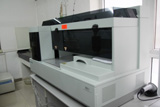Blood Urea Nitrogen (BUN)

- Quick look
- Why is BUN test done?
- How to prepare it?
- Normal result of BUN
- What does the test result mean?
- How to lower high BUN level?
BUN is an important test in evaluating renal function. Urea is the breakdown product of protein and it is formed in the liver. Urea then circulates in the blood in the form of urea nitrogen. In right condition, urea nitrogen is filtered out of body in the form of urine. However, if the kidneys fail to function properly, BUN level will rise. If severe liver disease occurs, BUN will decline.
Why is BUN test done?
BUN test is done to check the following problems:
●Kidney disease and liver disease
●Urine flow blockage
●Dehydration
●Burning
How to prepare it?
Before BUN test is done, the patients should stop taking medicines which can affect the result like chloramphenicol, streptomycin, amphotericin B, methicillin, gentamicin, tobramycin, and kanamycin, as well as diuretics and corticosteroids. They should also avoid eating too much meat.
Normal result of BUN
Normal BUN levels are 5-18 mg/dL for children; 7-18 mg/dL for adults; and 8-20 mg/dL in the elderly.
What does the test result mean?
Increased BUN levels suggest impaired kidney function. However, not in all cases, high BUN is associated with kidney impairment. It may be caused by decreased blood flow to the kidneys or obstruction of urine flow, or to dehydration.
Low BUN level is often not a problem. Low BUN may be due to severe liver disease, malnutrition, and hydration.
How to lower high BUN level?
As there is a variety causes of high BUN, the treatment methods will also be different.
If high BUN level is due kidney damage, the level will be lowered if the kidney damage can be reversed. However, there is no such a treatment in the conventional treatment. Micro-Chinese Medicine Osmotherapy is an effective treatment for renal patients. It can stimulate the self-renewing and self-repairing of kidney tissues and cells, thus improving renal function fundamentally.
Leave a Message
Any questions?Fill the form below and we will surely attend to you within 24 hours.Free medical answers from experts!
About Hospital
Patient Story
- The Key Point In The Course Of Treatment
- Drinking More And Urinate Frequently Means Kidney Problems
- How To Deal With Occult Blood With Correct Methods.
















